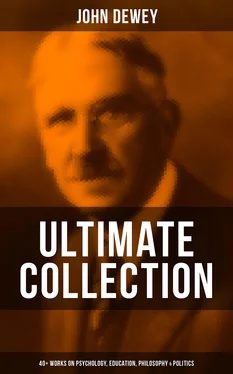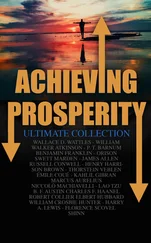Roughly speaking, they come into existence when social traditions are so complex that a considerable part of the social store is committed to writing and transmitted through written symbols. Written symbols are even more artificial or conventional than spoken; they cannot be picked up in accidental intercourse with others. In addition, the written form tends to select and record matters which are comparatively foreign to everyday life. The achievements accumulated from generation to generation are deposited in it even though some of them have fallen temporarily out of use. Consequently as soon as a community depends to any considerable extent upon what lies beyond its own territory and its own immediate generation, it must rely upon the set agency of schools to insure adequate transmission of all its resources. To take an obvious illustration: The life of the ancient Greeks and Romans has profoundly influenced our own, and yet the ways in which they affect us do not present themselves on the surface of our ordinary experiences. In similar fashion, peoples still existing, but remote in space, British, Germans, Italians, directly concern our own social affairs, but the nature of the interaction cannot be understood without explicit statement and attention. In precisely similar fashion, our daily associations cannot be trusted to make clear to the young the part played in our activities by remote physical energies, and by invisible structures. Hence a special mode of social intercourse is instituted, the school, to care for such matters.
This mode of association has three functions sufficiently specific, as compared with ordinary associations of life, to be noted. First, a complex civilization is too complex to be assimilated in toto. It has to be broken up into portions, as it were, and assimilated piecemeal, in a gradual and graded way. The relationships of our present social life are so numerous and so interwoven that a child placed in the most favorable position could not readily share in many of the most important of them. Not sharing in them, their meaning would not be communicated to him, would not become a part of his own mental disposition. There would be no seeing the trees because of the forest. Business, politics, art, science, religion, would make all at once a clamor for attention; confusion would be the outcome. The first office of the social organ we call the school is to provide a simplified environment. It selects the features which are fairly fundamental and capable of being responded to by the young. Then it establishes a progressive order, using the factors first acquired as means of gaining insight into what is more complicated.
In the second place, it is the business of the school environment to eliminate, so far as possible, the unworthy features of the existing environment from influence upon mental habitudes. It establishes a purified medium of action. Selection aims not only at simplifying but at weeding out what is undesirable. Every society gets encumbered with what is trivial, with dead wood from the past, and with what is positively perverse. The school has the duty of omitting such things from the environment which it supplies, and thereby doing what it can to counteract their influence in the ordinary social environment. By selecting the best for its exclusive use, it strives to reinforce the power of this best. As a society becomes more enlightened, it realizes that it is responsible not to transmit and conserve the whole of its existing achievements, but only such as make for a better future society. The school is its chief agency for the accomplishment of this end.
In the third place, it is the office of the school environment to balance the various elements in the social environment, and to see to it that each individual gets an opportunity to escape from the limitations of the social group in which he was born, and to come into living contact with a broader environment. Such words as "society" and "community" are likely to be misleading, for they have a tendency to make us think there is a single thing corresponding to the single word. As a matter of fact, a modern society is many societies more or less loosely connected. Each household with its immediate extension of friends makes a society; the village or street group of playmates is a community; each business group, each club, is another. Passing beyond these more intimate groups, there is in a country like our own a variety of races, religious affiliations, economic divisions. Inside the modern city, in spite of its nominal political unity, there are probably more communities, more differing customs, traditions, aspirations, and forms of government or control, than existed in an entire continent at an earlier epoch.
Each such group exercises a formative influence on the active dispositions of its members. A clique, a club, a gang, a Fagin's household of thieves, the prisoners in a jail, provide educative environments for those who enter into their collective or conjoint activities, as truly as a church, a labor union, a business partnership, or a political party. Each of them is a mode of associated or community life, quite as much as is a family, a town, or a state. There are also communities whose members have little or no direct contact with one another, like the guild of artists, the republic of letters, the members of the professional learned class scattered over the face of the earth. For they have aims in common, and the activity of each member is directly modified by knowledge of what others are doing.
In the olden times, the diversity of groups was largely a geographical matter. There were many societies, but each, within its own territory, was comparatively homogeneous. But with the development of commerce, transportation, intercommunication, and emigration, countries like the United States are composed of a combination of different groups with different traditional customs. It is this situation which has, perhaps more than any other one cause, forced the demand for an educational institution which shall provide something like a homogeneous and balanced environment for the young. Only in this way can the centrifugal forces set up by juxtaposition of different groups within one and the same political unit be counteracted. The intermingling in the school of youth of different races, differing religions, and unlike customs creates for all a new and broader environment. Common subject matter accustoms all to a unity of outlook upon a broader horizon than is visible to the members of any group while it is isolated. The assimilative force of the American public school is eloquent testimony to the efficacy of the common and balanced appeal.
The school has the function also of coordinating within the disposition of each individual the diverse influences of the various social environments into which he enters. One code prevails in the family; another, on the street; a third, in the workshop or store; a fourth, in the religious association. As a person passes from one of the environments to another, he is subjected to antagonistic pulls, and is in danger of being split into a being having different standards of judgment and emotion for different occasions. This danger imposes upon the school a steadying and integrating office.
Summary.
The development within the young of the attitudes and
Table of Contents
dispositions necessary to the continuous and progressive life of a society cannot take place by direct conveyance of beliefs, emotions, and knowledge. It takes place through the intermediary of the environment. The environment consists of the sum total of conditions which are concerned in the execution of the activity characteristic of a living being. The social environment consists of all the activities of fellow beings that are bound up in the carrying on of the activities of any one of its members. It is truly educative in its effect in the degree in which an individual shares or participates in some conjoint activity. By doing his share in the associated activity, the individual appropriates the purpose which actuates it, becomes familiar with its methods and subject matters, acquires needed skill, and is saturated with its emotional spirit.
Читать дальше












